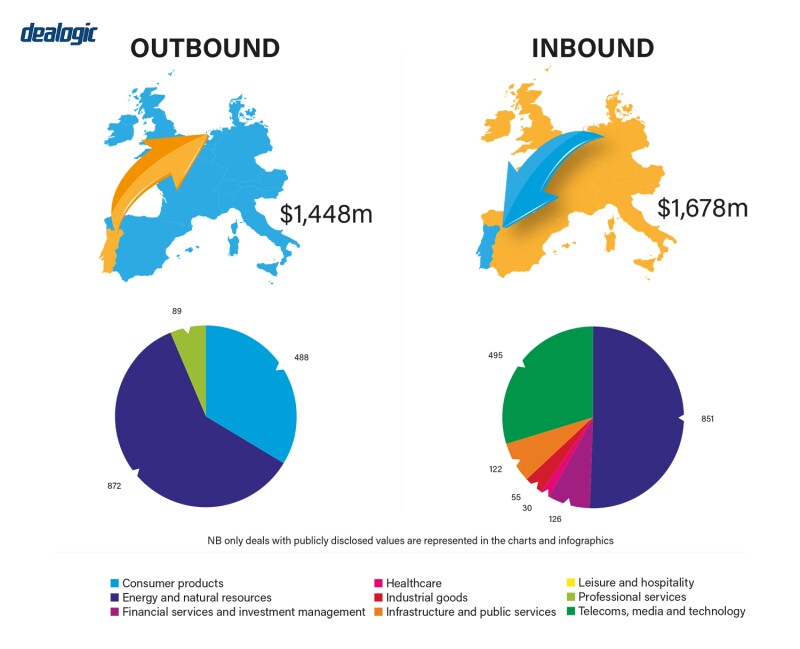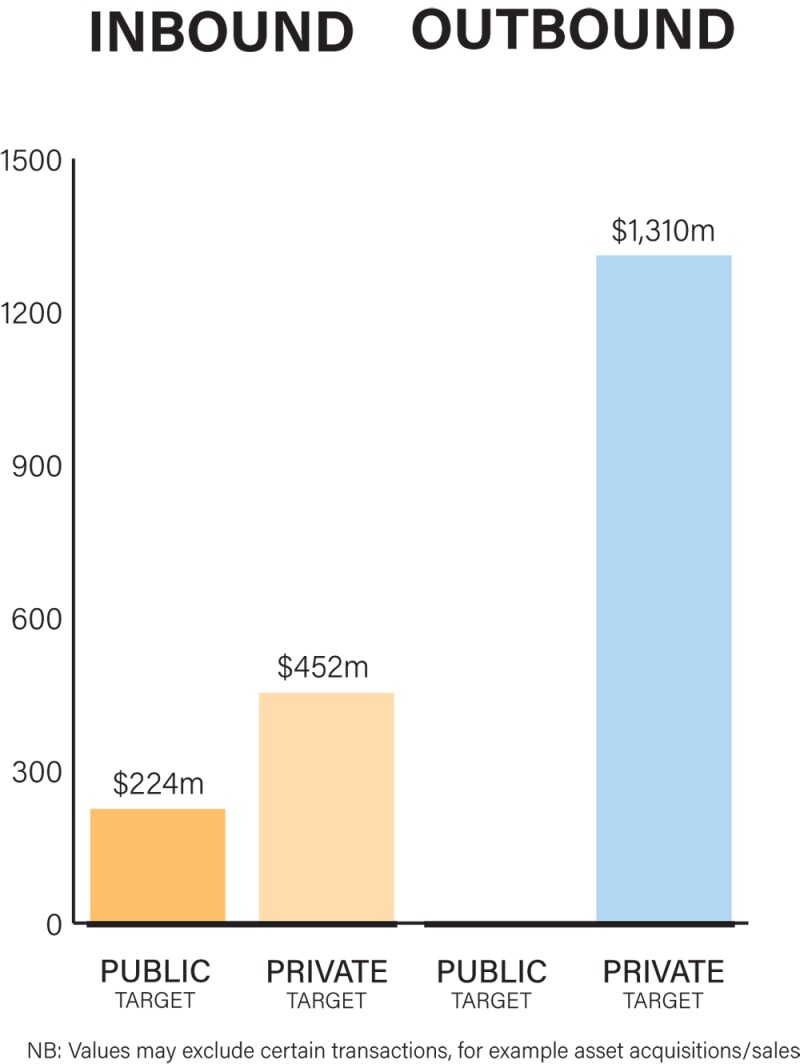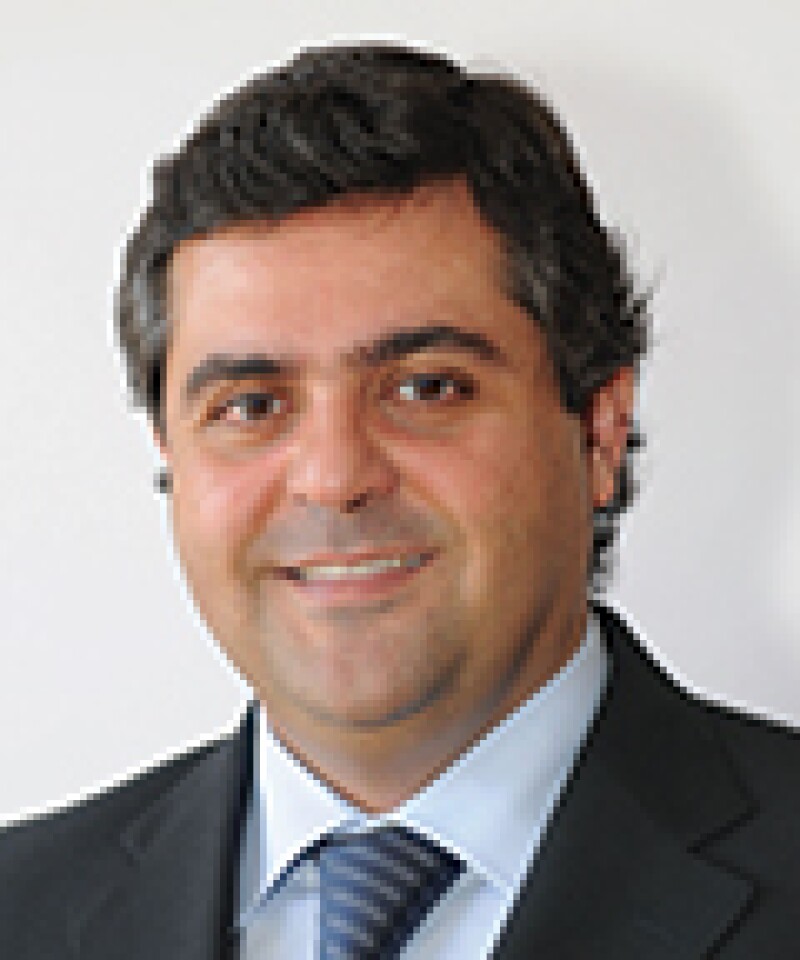The M&A market in Portugal did not experience a significant downturn during the Covid-19 pandemic, so expectations for the future, particularly for 2022, are positive.
However, the Portuguese M&A market has been affected mainly by the postponement of some transactions that, eventually, were/or will be concluded when more stable market conditions are met.
Portugal presents good opportunities in multiple sectors for long-term investors and those opportunities are also being seized by international investors seeking to diversify their portfolios both in terms of location and industry sectors.
Spain-based investors continue to lead inbound investment in Portugal, followed by US and France investors. Spain was the main destination for Portuguese M&A investment operations.
Also, privatisation processes expected for years to come in the Portuguese speaking African countries may attract the interest of Portuguese companies and third countries companies using Portugal as an investment platform to Africa.
When making any assessment on the Portuguese M&A market it is important to bear in mind that the majority of the transactions do not allow disclosure of amounts, therefore the public rankings available only include a minor part of the transactions.
The Portuguese market is essentially driven by private M&A transactions, considering the relatively small scale of the Portuguese capital markets and the average size of the Portuguese companies. However, some concentration movements in key sectors can give origin to public M&A transactions, particularly in the financial and construction sectors.
The Portuguese technology market has also proved to be an interesting target for foreign investors. It is important to bear in mind that the Portuguese startups and technology ecosystems have gained an important relevance in the recent years and some key steps are expected to be given by the local authorities in order to boost the development of the market conditions for creating and nurturing new projects.
In 2021, the sale of 24.99% share capital of Sonae MC took place. This is a major public M&A transaction. Another significant transaction in 2021 was the sale by Grupo Sonae of a 24.99% interest in Sonae MC to Camoens Investments, an entity owned by CVC funds.
Sonae MC is the leading Portuguese grocery retailer with almost 1,000 company operated stores and a €5.2 billion ($5.7 billion) turnover. Sonae MC operates under a multi-format portfolio and this transaction allowed it to partner with a top-tier long-term investor.
According to information disclosed by Sonae to the market the transaction was concluded for cash proceeds of €528 million and in addition to the cash proceeds, the consideration includes a contingent deferred cash payment of up to c. €63 million.
Economic recovery plans
The impact of Covid-19 in the M&A market has been limited, it mainly postponed some transactions, and in years to come the M&A market will benefit from the economic recovery and from the recovery plans/packages put in place by the EU.
When comparing the deal flow in 2021 with 2020, the number of transactions increased significantly, but the aggregate value of the transactions concluded has only shown a slight increase.
M&A transactions will increase in the next couple of years, attracting foreign investors to the Portuguese market, with foreign long-term investors seeking for good opportunities in a stable and regulated market.
|
|
“In 2021, the sale of 24.99% share capital of Sonae MC took place - this is a major public M&A transaction” |
|
|
Portuguese companies play an important role as investment platforms in exterior markets with which Portugal has long-lasting economic relations, like some African and Far Eastern countries and territories.
Some operations were concluded due to industry consolidation, others for other reasons including financing considerations (companies financially more heavily affected by Covid-19).
In 2020 the state played an important part in strategic companies – TAP and EFACEC – and despite all the attention around these nationalisations they did not result in major disputes and litigation between the state and former investors.
Both nationalisations occurred in order to protect the strategic companies that were in a poor financial situation, aggravated by the impact of COVID-19 in the air travel sector and other industries.
Financial investors such as private equity and funds are increasingly active in the Portuguese M&A environment.
Portuguese is seen as a stable and regulated market, an EU member country, open to foreign markets and friendly to foreign investors, where a majority of its younger generation have a good degree of proficiency in English.
All this, apart from the existing good opportunities from a strictly business perspective, is drawing the attention of long-term investors, such as funds, to the Portuguese M&A market. This is a trend that became even more evident in recent years and seems to be here to stay.
Legislation and policy changes
The main regulatory bodies that govern M&A transactions are the Portuguese Securities Market Commission (Comissão do Mercado de Valores Mobiliários – CMVM); Bank of Portugal (Banco de Portugal); Competition Authority (Autoridade da Concorrência); the Insurance and Pension Fund Supervision Authority (Autoridade de Supervisão de Seguros e Fundos de Pensões); the National Authority for Communications (ANACOM); the Energy Services Regulatory Authority (ERSE); and the ERC (media regulator). Depending on the target and the relevant sector of activity, other regulatory bodies may have a role in the transaction.
The key legislation that governs M&A activity is the Companies’ Code (Código das Sociedades Comerciais), the Securities’ Code (Código do Mercado de Valores Mobiliários), Competition Law (Lei da Concorrência) and other laws and regulations that may vary according to the industry sector in which the targeted company operates.
In order to further align the local laws with European law and to increase the attractiveness of the capital market to companies the Securities’ Code underwent a significant amendment in 2021. It is too early to assess the impact of the amendment on M&A transactions and activity.
It is fair to state that Covid-19 raised some concerns regarding the force majeure situations and around the force majeure clauses. This became the subject of acute scrutiny by all parties of a transaction.
Meanwhile, ESG concerns are also becoming more relevant each year that passes. These concerns arise both from the sellers’ and buyers’ sides. ESG good practices allow sellers to increase the value of their companies and assets and reduce the risks buyers are going to take.
The clauses addressing ESG situations and liabilities are mandatory in recent M&A transactions and ESG issues are also being addressed in the due diligence phase of the process. Considering that local practices and rules may vary, it is advisable to seek local advice regarding ESG issues.
It is likely that a new Banking Activity Code will be approved. This code is aimed at regulating banking activity and will revoke the Regime Geral das Instituições de Crédito e Sociedades Financeiras. The change may have some impact in operations involving financial entities.
The legislative process is very dynamic in Portugal and requires permanent update and contextualisation. Therefore, local legal advice is mandatory and decisive in the preliminary assessment of the operation.


Market norms
The most common issue that arise in relation to the Portuguese market derives from the fact that legislative and regulatory processes applicable to specific M&A transactions, with specific criteria and requirements are not familiar to foreign investors. It is not uncommon for foreign investors to believe that the procedures of their origin jurisdictions are the same as those applicable in Portugal. This can lead to a duplication of efforts that could be avoided from the beginning of the process.
The nature of frequently asked questions varies a lot and depends largely on the target company’s sector as well as the stage of the transaction. Nevertheless, the more important questions usually address issues such as corporate matters, M&A rules, competition, tax and regulatory aspects.
As for legal practice, technology in the deal-making process is increasingly important and companies are more aware of it and have been acting accordingly. During an M&A process it is not uncommon that a company is exposed to risks because it becomes the object of due diligence and auditing and therefore needs to share documents and negotiate with counterparties that may not adopt the same levels of security and care. Apart from preparing for external threats, companies may also internally control which information is disclosed during a negotiation process.
Public M&A
The Securities Code and regulations issued by the Portuguese Securities Market Commission (CMVM) provide the applicable rules for obtaining control of a public company. Those rules define the structure, content, and procedure to formalise a public offer. Public offers (addressed to most investors) require information to be issued in a standard way and are subject to registration with the CMVM.
The documents containing the offers’ mandatory information are called the prospectus (prospecto) and offer announcement (anúncio de lançamento) and are available on the Portuguese Securities Market Commission’s (CMVM) website. When preparing public offers and drafting these documents, the intervention of a financial intermediary is mandatory.
The prospectus and the offer announcement are the official documents that ensure that all the information necessary for the investors to take an informed and well-grounded decision regarding the public offer is made available. The organisation of the information in these documents is subject to models and templates, to allow for an easy comparison with different offers, between several types of securities and between different companies.
The prospectus and the offer announcement shall mandatorily include information on:
The offeror;
The type of offer;
The quality in which the financial intermediaries intervene;
The price and global amount of the offer or the range between the maximum and minimum price, the nature and other terms of payment;
The offer period;
The allotment criteria;
The conditions to which the offer is subject;
The places where the prospectus is published and made available;
and
The clearing entity.
The most common conditions attached to public offer takeovers are the approval by regulation authorities such as the competition authorities or sectoral regulators, as CMVM, or the acquisition of a certain threshold of shares.
In some offers there are conditions regarding the approval of certain governance documents or amendments to some governance documents by the shareholders.
Covid-19 has not changed these conditions as there was no recent legislation in this respect.
In the Portuguese public M&A sector, there is no common practice for break-up fees.
Private M&A
The sophistication of global transactions brings more complexity to transactions which commonly provide different solutions and mechanisms to determine a transaction’s price, either by means of a fixed price (locked-box mechanism) or an adjusted one (depending on the company’s performance – earn-out – or based in completion accounts).
Considering the characteristics of the different price adjustment models, some are usually seen as pro-buyer and while fixed price models are usually favoured by sellers. Likewise, the increase in M&A has led to more activity in the M&A-related insurance sector. This has become a trend in recent years and can be found not only in M&A transactions but also in assets transactions, especially in real estate transactions.
The conditions attached to a private takeover offer depend on the specifics of the transaction and what is agreed between the parties.
Purchase agreements relating to Portuguese companies and assets are typically governed by Portuguese law and subject to the jurisdiction of the Portuguese courts. When there are foreign investors it is common to subject the documents to foreign law. It is also very common that disputes are subject to international arbitration.
In the Portuguese market the typical exit is made through the target company’s shares being sold to the former holders or third parties, and not on the stock market. IPOs are one of the exit routes open to investors and in the last years we have seen some companies choosing to go public. However, this is not as common as in other jurisdictions.
Looking ahead
Considering that Portugal is an open market, the perspectives for M&A in this market reflect the main global trends.
Nonetheless, in Portugal good opportunities came at a more interesting value when compared to more mature markets, what is more pronounced in sectors such as real estate or tourism, with recent trends of nearshoring also creating the most positive expectations within technological and industrial activities.
ESG is in the spotlight and will definitely be a key issue in future transactions. By beginning to unlock ESG as an M&A priority and a consistent factor of the deal value, those companies will move ahead of the majority of companies that have yet to evolve their M&A models to consistently account for the growing sophistication of ESG. This is a challenge law firms must embrace now.

Nelson Raposo Bernardo
Managing partner
Raposo Bernardo & Associados
T: + 351 21 3121330
E: nrbernardo@raposobernardo.com
About the author
Nelson Raposo Bernardo is the managing partner of Raposo Bernardo & Associados. He is the head of the firm’s banking and projects practices and co-heads the corporate practice. He has more than 25 years of experience as a lawyer in high-profile and complex legal operations.
Nelson is strongly experienced and reputed in legislating, being a co-author of the present Portuguese Securities Code and has led several legislative reform committees, in several countries, in banking, financial, insurance, projects, start-ups and venture capital areas. He regularly advises clients on transactional work in the banking, infrastructure and pharmaceutical sectors. His recent transactions include advising an international bank consortium on an aircraft portfolio financing, a Portuguese bank in relation to asset and portfolio structuring for securitisation purposes in the automotive industry, and working for a Japanese bank concerning international credit operations.
Nelson is a graduate of law from the University of Lisbon, and also earned a master’s degree in juridical sciences (corporate law) from the same school. He is an assistant professor of corporate and commercial law at the University of Lisbon for almost 20 years and on a regularly basis teaches entrepreneurship, start-up, and management courses at INDEG-ISCTE Executive Education in Portugal.

Joana Andrade Correia
Partner
Raposo Bernardo & Associados
T: + 351 21 3121330
E: jacorreia@raposobernardo.com
About the author
Joana Andrade Correia is a partner at Raposo Bernardo & Associados, who has co-headed the corporate and M&A department for 20 years.
Joana has led multiple domestic and international operations, including corporate restructurings and M&A transactions for key players in different sectors such as aviation, banking and finance, pharmaceutical, energy and infrastructure. She has worked on several logistics projects in many special commissions to review and reform legislation in the telecommunications, media, broadcasting and infrastructure sectors. Her recent work includes advising a major European private airline in the privatisation of a public airline, a large German bank in the negotiation and preparation of a bank financing relating to the acquisition of commercial aircraft portfolio, and an aircraft leasing platform on transactions involving airlines and aircraft leasing companies, acquisitions and leveraged financings.
Joana holds a degree in law from the University of the Lisbon. She has further post-graduate qualifications in business and corporate law by the Catholic University of Lisbon, in legistics and legislation science by the University of Lisbon, and in tourism law by the Estoril Tourism School.



